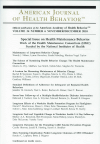
Who Enrolls in a Quit Smoking Program with Yoga Therapy?
Keywords: AGE; SEX DIFFERENCES; SMOKING CESSATION; YOGA
Document Type: Research Article
Affiliations: 1: Professor, Department of Psychiatry and Human Behavior, Alpert Medical School of Brown University, Providence, RI;, Email: [email protected] 2: Assistant Professor, Department of Public Health, University of Massachusetts Lowell, Lowell, MA 3: Assistant Professor, Department of Behavioral and Social Sciences, Brown University School of Public Health, Providence, RI 4: Research Associate, Centers for Behavioral and Preventive Medicine, The Miriam Hospital, Providence, RI 5: Assistant Professor, Department of Psychiatry and Human Behavior, Alpert Medical School of Brown University, Providence, RI 6: Professor, Departments of Emergency Medicine and Behavioral Social Science, Alpert Medical School of Brown University, Providence, RI 7: Professor and Chair, Department of Family Medicine and Public Health, University of California San Diego, San Diego, CA 8: Post-Doctoral Fellow, Centers for Behavioral and Preventive Medicine, The Miriam Hospital, Providence, RI
Publication date: 01 November 2017
The American Journal of Health Behavior seeks to improve the quality of life through multidisciplinary health efforts in fostering a better understanding of the multidimensional nature of both individuals and social systems as they relate to health behaviors.
The Journal aims to provide a comprehensive understanding of the impact of personal attributes, personality characteristics, behavior patterns, social structure, and processes on health maintenance, health restoration, and health improvement; to disseminate knowledge of holistic, multidisciplinary approaches to designing and implementing effective health programs; and to showcase health behavior analysis skills that have been proven to affect health improvement and recovery.
- Editorial Board
- Information for Authors
- Submit a Paper
- Subscribe to this Title
- Review Board
- Reprints and Permissions
- Ingenta Connect is not responsible for the content or availability of external websites
- Access Key
- Free content
- Partial Free content
- New content
- Open access content
- Partial Open access content
- Subscribed content
- Partial Subscribed content
- Free trial content